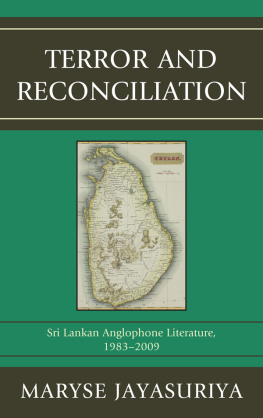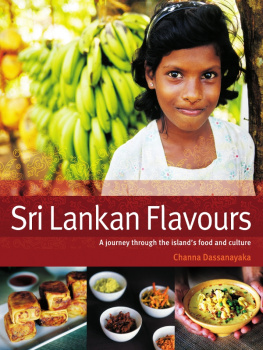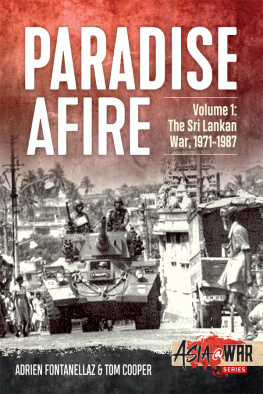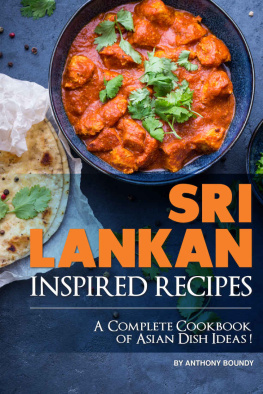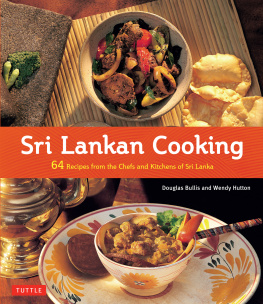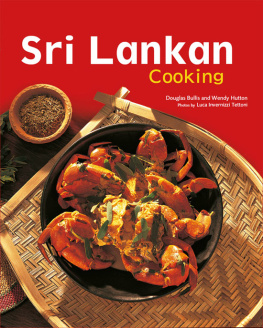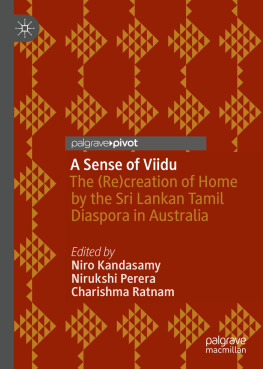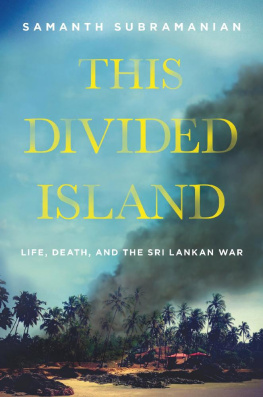Terror and Reconciliation
Published by Lexington Books
A wholly owned subsidiary of The Rowman & Littlefield Publishing Group, Inc.
4501 Forbes Boulevard, Suite 200, Lanham, Maryland 20706
www.rowman.com
10 Thornbury Road, Plymouth PL6 7PP, United Kingdom
Copyright 2012 by Lexington Books
All rights reserved. No part of this book may be reproduced in any form or by any electronic or mechanical means, including information storage and retrieval systems, without written permission from the publisher, except by a reviewer who may quote passages in a review.
British Library Cataloguing in Publication Information Available
Library of Congress Cataloging-in-Publication Data
Jayasuriya, Maryse.
Terror and reconciliation : Sri Lankan Anglophone literature, 1983-2009 / Maryse Jayasuriya.
p. cm.
Includes bibliographical references and index.
ISBN 978-0-7391-6578-2 (cloth : alk. paper) ISBN 978-0-7391-6579-9 (electronic)
1. Sri Lankan literature (English)20th centuryHistory and criticism. 2. Sri Lankan literature (English)21st centuryHistory and criticism. 3. Sri LankaIn literature. 4. War in literature. 5. Ethnic relations in literature. 6. Reconciliation in literature. I. Title.
PR9440.05. J39 2012
| 820.9'95493dc23 | 2012004482 |
The paper used in this publication meets the minimum requirements of American National Standard for Information SciencesPermanence of Paper for Printed Library Materials, ANSI/NISO Z39.48-1992.
Printed in the United States of America
For my parents, Leslie (1927-2010) and Yvonne Jayasuriya,
with love and gratitude
Acknowledgments
This book is the result of many years of hard work and could not have been completed without the help of many people. This project took shape under the guidance of Aparajita Sagar, and I would like to thank her, Shaun Hughes, Emily Allen, and Margaret Rowe for their advice throughout the projects early stages.
As Chairs of the English Department at the University of Texas at El Paso (UTEP), Evelyn Posey and David Ruiter have encouraged my pursuit of this project. My colleagues in the UTEP English Department have each in his or her own way contributed to creating an environment in which I was able to finish this project. Special thanks to the literature faculty: Meredith Abarca, Shelley Armitage, Ezra Cappell, John Dick, Ruben Espinosa, Mimi Gladstein, Robert Gunn, Lawrence Johnson, Deane Mansfield-Kelley, Lois Marchino, Marion Rohrleitner, Thomas Schmid, and Tony Stafford.
The Purdue Research Foundation supplied funding through two summer grants that enabled me to travel to Sri Lanka for research purposes and two year-long grants that made my labors lighter at a crucial stage in the writing of this book.
At Lexington, Justin Race has been a very supportive and helpful editor, and he, Sabah Ghulamali, and Megan Barnett have been a pleasure to work with. I thank the anonymous readers for Lexington who spent so much time and effort responding to and commenting on my work.
I am grateful to Jean Arasanayagam, Suresh Canagarajah, Arjuna Parakrama, Anne Ranasinghe, Amirthanjali Sivapalan, Sivamohan Sumathy, Vivimarie Vanderpoorten, and Kamala Wijeratne for permission to quote from their work, and to Amal Siriwardena for permission to quote from the work of Regi Siriwardena and Rajiva Wijesinghe for permission to quote from the work of Richard de Zoysa. I would also like to thank Gary Pulsifer of Arcadia Publishers for permission to quote from When Memory Dies , by A. Sivanandan. Portions of chapter 5 appeared in South Asia and Its Others: Reading the Exotic, edited by Atreyee Phukan and V.G. Julie Rajan, and portions of chapter 2 appeared in a different form in a special edition of South Asian Review , edited by Feroza Jussawalla and Deborah Weagel. Im grateful for permission to reprint from both of these essays.
My circles of friends from various stages and places of my life in Sri Lanka and at Mount Holyoke College, Purdue University, and UTEP have always been there for me. Special thanks to Sonali Pathirana (who even helped me track down authors for permissions purposes), Sharnila Henry, Mishthi Senewiratne, Sharmila Wijesuriya, Fazlah Bahaudeen, Rehana Dawood, Amali Fernando, Katie Patrick Lokmaci, Shanthi Divakaran, Kathleen Maloney, Tracy Collins, Celeste Heinze, Shamala Kumar, Danesh Karunanayake, James and Carrie Palmer, Roy Mathew, Vinny Kaur, Yoshie Hagiwara, Andre Ellis, James and Patti Lyons, and Bill and CJ Moore, whose friendship has sustained me.
My parents, Leslie and Yvonne Jayasuriya, have always encouraged me in my academic endeavors, even when it meant that I would have to move half a world away. I have always been able to count on them for everything, and my debt to them is too great to be measured. I thank my sisters Carmeline Jayasuriya and Rosanne Weerackoon, my brother-in-law Roshan Weerackoon, my nephew Ranil and my nieces Rochelle and Rushika for their love, support, and prayers.
I can honestly say that this book would not have been written if not for my husband, Brian Yothers. His intellectual curiosity and sheer hard work have both amazed and inspired me. Only he can know how much his love, support, advice, and patience have meant to me in this, and in everything else.
Chapter 1
Sri Lankan Anglophone Literature and the Problem of Publication
The events of September 11, 2001, erased the memory of what might otherwise have been the most spectacular and traumatic suicide terrorist attack of the year worldwide. On July 24, 2001, armed men entered the Bandaranaike International Airport in Katunayake, Sri Lanka, and sprayed bullets through the departure lounge. Several of their confederates, wearing the suicide vests that their organization had perfected, ran toward the six new Sri Lankan Airlines jets and detonated their bombs. The attack was sudden, unexpected, and profoundly unsettling to both Sri Lankans and visitors to the country. Moreover, the attack had been preceded by a long series of highly visible suicide bombings from the late 1980s on, which included the assassinations of Sri Lankan president Ranasinghe Premadasa, Indian ex-prime minister Rajiv Gandhi, and numerous Sri Lankan political figures; the attempted assassination of Sri Lankan president Chandrika Kumaratunga; and the bombings of highly visible public sites like the Buddhist Temple of the Tooth in Kandy and the Central Bank in Colombo. Sri Lankas woes, however, became overshadowed by more visibly global concerns following September 11, 2001. For Sri Lankans, however, the war that raged from July 1983 until May 2009 was anything but peripheral, and the current shape of Sri Lankan literature in English reflects the centrality of war, terrorism, and attempts at reconciliation to the Sri Lankan experience of the late twentieth and early twenty-first centuries.
At the beginning of the twenty-first century, with ethnic violence and global terrorism on the rise, Sri Lanka had the dubious distinction of being one of the few countries to have dealt with these phenomena continuously for over two decades. From the ethnic riots of July 1983 until the military defeat of the Liberation Tigers of Tamil Eelam (LTTE) in May 2009, Sri Lanka consistently dealt with the issues of terrorism, human rights, ethnic violence, and political uncertainty that have engrossed the wider world over the last decade. Sri Lankas small size and the fact that the conflict there does not mesh readily with the narratives about terrorism and human rights that are widespread through much of the rest of the world have meant that much of the trauma of the islands Sinhalese, Tamil, Muslim, and Burgher inhabitants has been invisible to the rest of the world. This invisibility has not, however, prevented Sri Lankans from seeking to represent and understand their collective tragedy in fiction, poetry, and film. The body of Anglophone literature that has sprung from the ethnic conflict in Sri Lanka both reveals the impact of terrorism and ethnic violence on a particular society and seeks to understand how and why the conflict took root. Although the war in Sri Lanka has ended, the search for interethnic amity and reconciliation embodied by many of these works remains crucial for the future peace and well-being of Sri Lanka and vital as well for the pursuit of peace and reconciliation around the planet.
Next page
